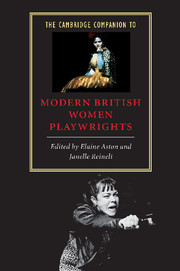1 - A century in view: from suffrage to the 1990s
Published online by Cambridge University Press: 28 May 2006
Summary
Early in 1998 both stages at the Royal Court, arguably England’s most high-profile venue that supports new playwriting, were occupied by women playwrights: the late Sarah Kane’s Cleansed played in the main house, Theatre Downstairs, while Rebecca Prichard’s Yard Gal was premiered in the Theatre Upstairs studio. An outsider might be forgiven for thinking that the tables had finally turned: that women playwrights had at last achieved a significant presence at the close of the century. However, like several other 'stages' in our twentieth-century history of women’s playwriting, the contemporary situation for women dramatists is far less propitious than one might at first suppose. Looking briefly at the 1998 productions of Kane and Prichard offers us a way into our fin-de-siècle moment of women’s playwriting, and a way back to the different historical contexts of twentieth-century playwriting presented in this Companion.
Kane and Prichard were contemporaries: both born in 1971; both from Essex; both university-educated (although Kane confessed that her experience of the Master’s degree in playwriting at Birmingham University 'nearly destroyed her as a writer'), and both were fortunate enough to launch writing careers through the Royal Court. There, however, the similarities end. Kane’s playwriting career began in controversy over her first full-length play, Blasted, staged at the Court’s studio venue in 1995, which outraged both the serious and the tabloid press for its scenes of horror - most particularly the cannibalism of a dead baby.
- Type
- Chapter
- Information
- Publisher: Cambridge University PressPrint publication year: 2000
- 1
- Cited by

